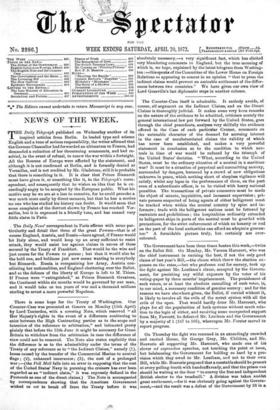The Counter-Case itself is admirable. It entirely avoids, of course,
all argument on the Indirect Claims, and on the Direct Claims is thoroughly judicial. It makes some very keen remarks on the nature of the evidence to be admitted, criticises acutely the general international law put forward by the United States, goes through the chief precedents, analyses very skilfully the evidence offered in the Case of each particular Cruiser, comments on the untenable character of the demand for accruing interest in the case of unsubstantiated claims the validity of which has never been established, and makes a very powerful statement in conclusion as to the condition to which neu- trals in time of war would be reduced by the triumph of the United States' doctrine. "What, according to the United States, must be the ordinary situation of a neutral in a maritime war? It must be a situation of perpetual and unremitting anxiety, surrounded by dangers, harassed by a crowd of new obligations unknown in peace, which nothing short of sleepless vigilance will satisfy, whilst any lapse in the performance of them, on the part even of a subordinate officer, is to be visited with heavy national penalties. The transactions of private commerce must be made the object of minute, inquisitive, and incessant supervision ; pri- vate persons suspected of being agents of either belligerent must be tracked when within the neutral country by spies and in- formers ; trade with the belligerent nations must be fettered by restraints and prohibitions ; the hospitalities ordinarily extended to belligerent ships in ports of the neutral must be guarded with precautions, for the strict enforcement of which no honesty or zeal on the part of the local authorities can afford an adequate guaran- tee." A formidable picture truly, but certainly not over- coloured.


































